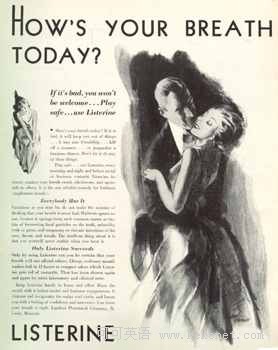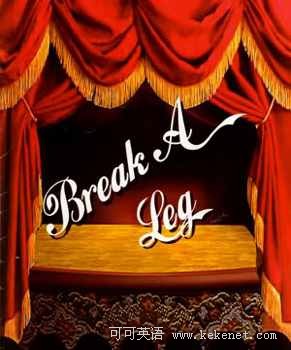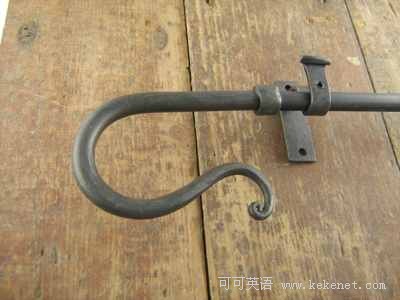(单词翻译:单击)
This is a list of phrases we are all familiar with and most likely use from time to time. The origins of these phrases are often unexpected and strange. As you will see on this list, some of them originate in places you simply wouldn’t believe. If you know of any others be sure to share them in the comments. The source for this list was The Book of Beginnings (out of print).
以下列出的是一些我们熟悉的并且经常使用的短句。然而其中一些短句的出处却是出乎人们意料之外的。从这个列表中你们可以看到,一些短语的出处是你们不敢相信的。如果你们知道其他短语和出处,请不要忘了在评论中与我们分享。这张列表的来源是The Book of Beginnings。

10 Always a Bridesmaid, Never a Bride 总是伴娘,永远不是新娘。
This phrase, surprisingly, was used to sell Listerine mouthwash! To promote their product, the manufacturers of Listerine employed the personal experience of girls at the time, who desperately wanted to settle down but seemed always to be left on the shelf. First used in the 1920’s, it portrays a situation and a possible explanation for the lack of success these girls had. Here is the transcript of the ad:
令人吃惊的是,这个短句是李斯德林漱口水的广告语!为了促进他们的产品,李斯德林的生产商在当时雇用了一些想要安定下来却一直被挂起的有个人经验的女孩。1920年,广告第一次放映,它描述了一个场景解释了这些女孩为什么没有成功的可能的原因。以下是广告的全部:
Poor Edna was getting on for thirty and most of her girlfriends were either already married, or about to tie the knot. How she wished that, instead of being their bridesmaid, she could be the bride! However, any romance of hers invariably ended quickly. There was a reason. Unbeknownst to her, she suffered from bad breath and no one would tell her, not ever her closest friends. The advertisement sold millions of bottles of mouthwash and also gave the English language a new saying!
可怜的艾德娜快要30岁了,她的很多女朋友要么已经结婚了要么快要喜结良缘了。她也是多么希望步入婚姻的殿堂做新娘而不是伴娘啊!~ 然而,所有的浪漫与她总是迅速终结。有一个原因。大家都瞒着她,她有口臭,没有人会告诉她,即使是她最亲密的朋友也没有告诉她。 这个广告帮助工厂销售了百万瓶漱口水,并且这个新兴的英语也流传了下来。
9 Bark up the wrong tree 错怪了某人

Originating back when hunting was still a major sport, this phrase came from when animals were used to track, catch or retrieve prey. This applies, not least, to dogs. Dogs were used in the chasing of raccoons, which was chiefly undertaken at night and were trained to indicate the tree in which the animal had taken refuge by barking at it. Of course, even dogs can err and, at times, barked up the wrong tree.
这句话要追溯到以打猎为主要运动的时代,这时的动物们被用来追踪、捕猎和取回猎物。这个应用,尤其针对狗。狗在当时被用来追踪浣熊,一般都在夜晚进行。狗是被训练过的,可以在浣熊的藏身之树前大叫。当然,狗也有犯错的时候,它可能对着错误的树大叫...
8 Be on a good footing 有一个良好的基础

A pleasant relationship with other people, not least those in a superior position, is portrayed as being ‘on a good footing’ with them. There are two thoughts as to where this saying came from. Some say the phrase goes back to a practice of early apprenticeships. It was the custom, on the first day at work, for apprentices to invite all their workmates for drinks. The new apprentice ‘footed the bill’. If proved a generous host, he made friends for keeps. The hospitality would never be forgotten.
与其他人,尤其是和那些身处高位的人有良好的人际关系表明了你和他们“有良好的基础”。对于这个短语是从哪来的,有两种说法。有人说这句话可以追溯到早期学徒的实践。这是一个传统,作为学徒工作的第一天,他要邀请他所有的同事喝饮料。这个新学徒付账。如果大家认为他是一个慷慨的东道主,他就会交到朋友。他的朋友们永远也不会忘记他的盛情款待。
Recalling how much it had cost, it was said the novice gained ‘a good footing’. A second derivation links the phrase with an early and bizarre interpretation of human anatomy, the importance given to the length of one of a person’s digits. At one time, the dimension of the middle toes determined a person’s ‘standing’ in the community. Thus, the measurement of their foot decided their status in the eyes of others. Those whom nature and genes had endowed with large feet were lucky to be ‘on a good footing’. Draw your own conclusions on this one!
当回顾这花销了多少钱时,被说成是初学者得到了“良好的基础”。第二个来历与一个早期的人类解剖学的怪异解释有关,尤其是一个人的足趾的长度。在某一时期,人的中脚趾的长度决定着他在社会中的“地位”。因此,他们脚的尺寸决定着他们在其他人眼中的地位。那些天生具有大脚的人就被幸运的称为“有良好基础”的人。对于这个短语的来历,请读者们自己得出结论吧。
7 Beat around the bush 兜圈子

Someone who doesn’t get to the point is said to ‘beat around the bush’. The origin of this phrase is, undoubtedly, from hunting, and more specifically from the hunting of boars. A ferocious animal, it often hid in the undergrowth and beaters were employed and ordered to go straight in to chase it out. But very much aware, and afraid, of the animals’ sharp tusks, they much preferred to merely ‘beat around the bush’ a practice strongly disapproved of by their masters.
那些讲话不说重点的人都在“绕圈子”。这个词的来历无疑是来自打猎,特别是打猎公猪。一种凶猛的动物,它经常躲在灌木丛里,于是人们请来了公猪的克星,让它笔直的冲进灌木将公猪逐出。但是出于对公猪锋利的长牙的警惕和恐惧,他们更喜欢绕着灌木“兜圈子”,严重违反了主人的指令。
6 Best foot forward 伸最好的那只脚(展示最好的一面)

When you are trying to make a good impression it is said that you should put your ‘best foot forward’. There are many options as to where this phrase came from, one being that it was believed that ‘the left’ was the realm of the devil, of evil and misfortune. After all the Latin word sinister means left, and in English sinister has kept its ominous meaning. Hence, it was advisable to keep the left foot behind and step forward with the best, the right, foot first.
如果你想要给人留下一个好印象,也就是说你需要“展示最好的一面”。对于这个词的来历有很多个观点,其中的一个是:人们觉得左脚是恶魔、邪恶和不幸的领域。毕竟在拉丁语中“邪恶”这个词也意味着“左侧”,所以在英语中这个词还保持着它不幸的含义。所以,人们建议把左脚放在后面,而第一个伸最好的,右脚。
But this phrase seems to have come from the fashion world, rather than the occult. The saying can be traced to male vanity, particularly apparent in the late eighteenth century, the period of the dandy. His desire to attract people’s attention and admiration took strange and elaborate forms. At the time, people imagined that their two legs differed in shape and that ‘normally’ one was more becoming than the other. To draw attention to it they kept the worse one in the background, literally putting ‘their best foot forward’, and with it, of course, their leg.
但是这个词好像来自时尚界,而不是民间。这个词可以追溯到男性虚荣心尤其明显的18世纪末期,那是个花花公子的时代。他用奇怪和巧妙的形式来吸引人们的注意力和赞赏。在当时,人们想象他们的两条腿在形状上是不同的,“正常的”一条比另一条要更适宜。为了使它引人注意,人们把不好的那条腿放在后面,字面上来说就是把“他们的好脚放在了前面”,当然并上这条腿。
5 Bite the bullet 咬住子弹

A person who ‘bites the bullet’, without any sign of fear, acts with great courage in the face of adversity. The phrase recollects a dangerous army practice in the 1850s. Soldiers were then equipped with the British Enfield rifle. Prior to using it, they had to bite off the head of the cartridge to expose the explosive to the spark which would ignite it. The procedure was fraught with danger, particularly so in the heat of battle. It needed firmness and courage, as even the slightest deviation or hesitation would endanger the soldier.
一个“咬住子弹”的人,在逆境中表现得毫无畏惧和勇敢。这词组回顾了发生在1850年的一次军队的危险做法。士兵们全都装备上了英国Enfield步枪。在使用它之前,士兵们不得不咬掉枪弹头,使爆炸性物质暴露在火花下,使其点燃。这个过程充满着危险,特别是在战争的气氛中。这需要沉着和勇气,因为即使是轻微的偏差或犹豫都会危及士兵的生命。
4 Blow Hot and Cold 摇摆不定

People who waver in their opinions and quickly change from being enthusiastic to showing disinterest are said to ‘blow hot and cold’. The saying can be traced to one of Aesop’s Fables. It was a cold winter’s day, and the freezing traveler was blowing on his stiff fingers.
那些摇摆于他们的意见中,并迅速由热情变为毫无兴趣的人叫“摇摆不定”。这成语可以追溯到一篇伊索寓言。这是一个寒冷的冬日,一个冻僵着的旅行者正对着他僵硬的手指哈气。
Mystified, a satyr wanted to know what he was doing. The man explained to him that, with his breath, he was warming his chilled fingers. Taking pity on him, the satyr invited the man to his home for a hot meal. This time, he watched him blowing on the food, which intrigued him all the more. Inquiring why he did so, his guest explained that he was blowing on the stew to cool it down. There and then the satyr told the traveler to leave at once. He was not prepared to entertain, or even mix with, someone who could ‘blow hot and cold from the same mouth’.
一个森林之神大惑不解,他想知道男子在做什么。该名男子向他解释说,他正用他的呼吸温暖他冰冷的手指。森林之神可怜这个男子就邀请他到他家中吃点热的食物。这一次,森林之神看见他更感兴趣的对着食物吹着气。又询问他为什么这样做,他的客人解释说,对着炖菜吹可以使热菜凉下来。之后,森林之神要求这个旅行者立即离开。他没有准备好招待,甚至没有准备好和那些可以“从同一张嘴里既吐出冷气又吐出热气”的人相识。
3 Break a leg 断一条腿 (好运)

To wish an actor prior to his going on stage to ‘break a leg’ is a well-known practice. A pretty strange wish, actually it is meant magically to bring him luck and make sure that his performance will be a success. From the superstitious age it was thought that jealous forces, always present, are only too anxious to spoil any venture. A good luck wish would alert and provoke them to do their evil work, whilst a curse will make them turn their attention elsewhere. The underlying principle is the belief that if you wish evil, then good will come. I’m sure it’s called reverse psychology these days.
在一个演员上台之前预祝他“断一条腿”是一个众所周知的行为。这是一个奇怪的祝福,事实上,这意味着神奇般的带给他好运和确保他的演出成功。在迷信的岁月里,人们认为一直存在的嫉妒的力量是十分急躁的,它会破坏任何冒险。一个好运的祝福会警惕并促使他们做邪恶的工作,然而诅咒会转移他们的注意力。最基本的理论就是,如果你的祝福邪恶,好运反会来临。我觉得这个现在叫做逆反心理。
2 Bury the hatchet 埋了斧头(放下屠刀)

To bury the hatchet means to create peace. With hostilities at an end, the hatchet was no longer needed, and therefore could be disposed of. Now a merely figurative expression, the phrase is based on an actual practice of North American Indians. When negotiating peace, they buried all their weapons; their tomahawks, scalping knives and clubs. Apart from showing their good faith, simultaneously it made it impossible for them to go on fighting.
"埋了斧头“意味着创建和平。敌意已经到头了,斧头也没有了用武之处,所以应该搁置起来了。这是个形象化的表达,这个俗语是建立在北美印地安人的实际做法上的。当和平谈判时,他们会把所有的武器:斧钺勾叉,棍棒等全部掩埋。除了显示他们的诚意外,同时,这样做他们也不可能继续战斗。
1 By hook or by crook 用各种钩子(不择手段)

The achievement of a goal with determination, by fair means or foul, is described as getting things done ‘by hook or by crook’. The origin of this phrase is linked with an early British practice, at a time when forests were still the exclusive property of royalty. For any unauthorized commoner, then, to gather firewood in them was a crime, poor people being the only exception. Though they were not permitted to cut or saw off branches, they were free to remove withered timber from the ground or even a tree, doing so by means of either a hook or a crook.
不管用正义还是非正义的手段来实现决定的目标被描述为“不择手段”。这个成语的来由是和早先英国的一个行为有关,那时候森林还是皇家的专属财产。对于任何未经授权的平民,收集木柴是犯罪的,唯独穷人是个特例。虽然他们不被允许砍伐或运送木材,但是他们可以自由的从地上或是树上“用各种钩子”把枯萎的树枝拉走。


